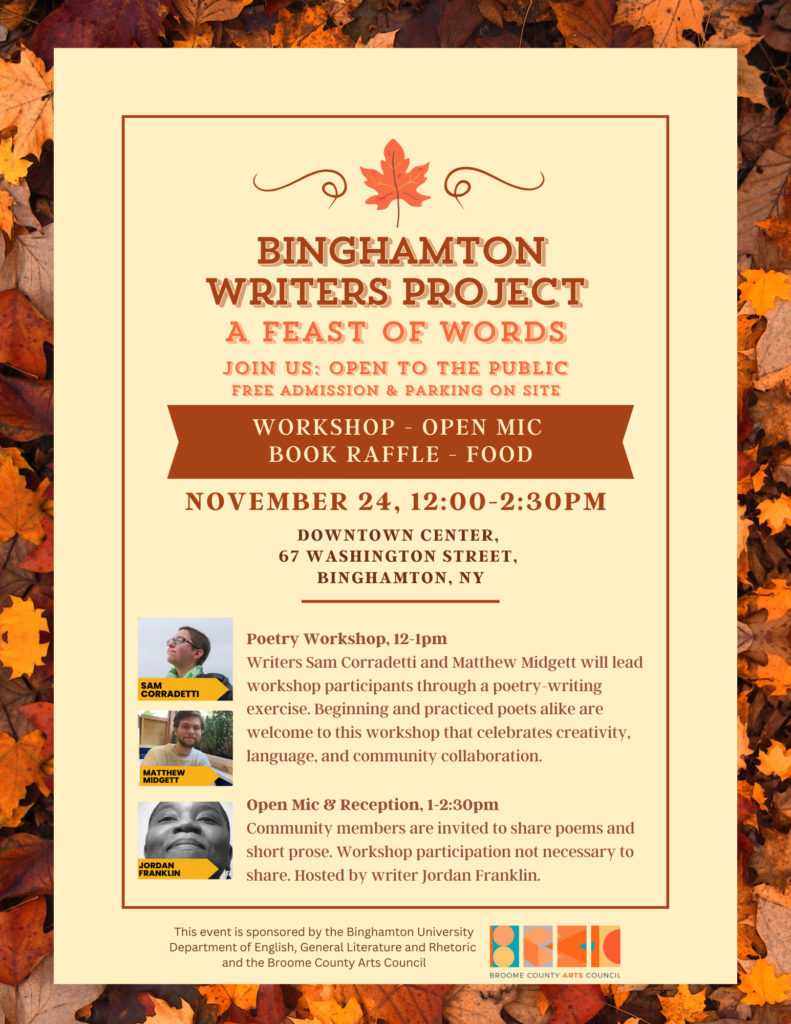The NYS Council on the Arts established the Decentralization Program (DEC) in 1977 to foster the continued development of local cultural resources. DEC serves all of New York’s 62 counties, including areas that are geographically isolated, economically disadvantaged, and ethnically diverse. The Chenango Arts Council has administered the DEC Program since 1986, serving artists, and arts and cultural organizations in Broome, Chenango and Otsego Counties.
IN ORDER TO APPLY FOR DEC GRANTS, ATTENDING AN INFORMATION SESSION IS REQUIRED.
TYPES OF GRANTS OFFERED:
Community Arts (CA) Grants:
CA grants provide support for arts and cultural projects to community-based organizations, groups, collectives, or individual artists. Individual artists must apply for a CA grant for a community-based project in partnership with a local nonprofit organization. CA support enables emerging artists and organizations to grow professionally and to enhance the cultural vibrancy in communities and neighborhoods where they live and work. CA grants provide support to develop, foster, promote, enhance, and increase community arts that address current cultural needs in Broome, Chenango and Otsego counties.
Arts Education (AE) Grants:
AE grants offer two funding categories: (1) K-12 In-School Projects and (2) After-School & Community-Based Learning. AE Grants support nonprofit organizations, cultural groups and/or individual artists in providing in-depth, arts education projects to participants of all ages. This funding is designed to support effective and innovative approaches to artist-led instruction both in and outside a school setting. These grants are meant to build the capacity of local artists and nonprofit arts organizations while providing K-12 public school students and/or community members’ high-quality artistic learning experiences.
Projects should draw on arts education practices to engage participants in the creation and interpretation of artistic works. Instruction must be sequential, age appropriate and skill-based, and focused on the exploration of art and the artistic process. Arts Learning projects are intended to serve a dedicated group of learners, be it in-school students, or youth and/or adult learners, and do not need to be open for participation by the general public. Emphasis is placed on the depth and quality of the creative process through which participants learn through or about the arts.
K-12 In-School Projects – These projects must take place during the school day and in a public school setting. Private, parochial and home schools are ineligible to serve as partner schools. Inter-curricular collaboration is encouraged but not required. AE funds must not replace, or appear to replace, the role of certified arts teachers in schools. Activities must occur in school, during the regular school day (no extracurricular activities that take place outside the normal school day). Students may not be taken out of regular classes to participate, or be self-selected for participation in the program.
A letter of commitment from the partner school to the arts organization or artist must be included with the application. The letter of commitment must outline in detail the school’s support of the project (monetarily and/or otherwise) and anticipated roles and responsibilities for each partner involved. The letter must be written on school letterhead and signed by the principal.
After-School and Community-Based Learning – These projects take place in a community-based setting and can be for a specific age group or participants of any age. Participation may be limited to a specific group and does not need to be open to the general public. If the applicant is an individual artist or unincorporated entity, there must be a partnership or fiscal sponsorship with an eligible nonprofit partner, which must be identified in the application. A written letter of commitment/ agreement from the nonprofit partner / fiscal sponsor to the artist or unincorporated entity must be included with the application. The letter of commitment must outline in detail the partner’s support of the project (monetary and otherwise) and anticipated roles and responsibilities for each partner involved.
If the applicant is an individual artist or unincorporated entity, there must be a partnership or fiscal sponsorship with an eligible nonprofit partner, which must be identified in the application. A written letter of commitment / agreement from the nonprofit partner / fiscal sponsor to the artist or unincorporated entity must be included with the application. The letter of commitment must outline in detail the partner’s support of the project (monetary and otherwise) and anticipated roles and responsibilities for each partner involved.
If you have any questions, need assistance, or need further information – please call or email Eric Rigg at 607.336.2787 | eric.rigg@chenangoarts.org or Alecia ONeill | alecia.oneill@chenangoarts.org







































